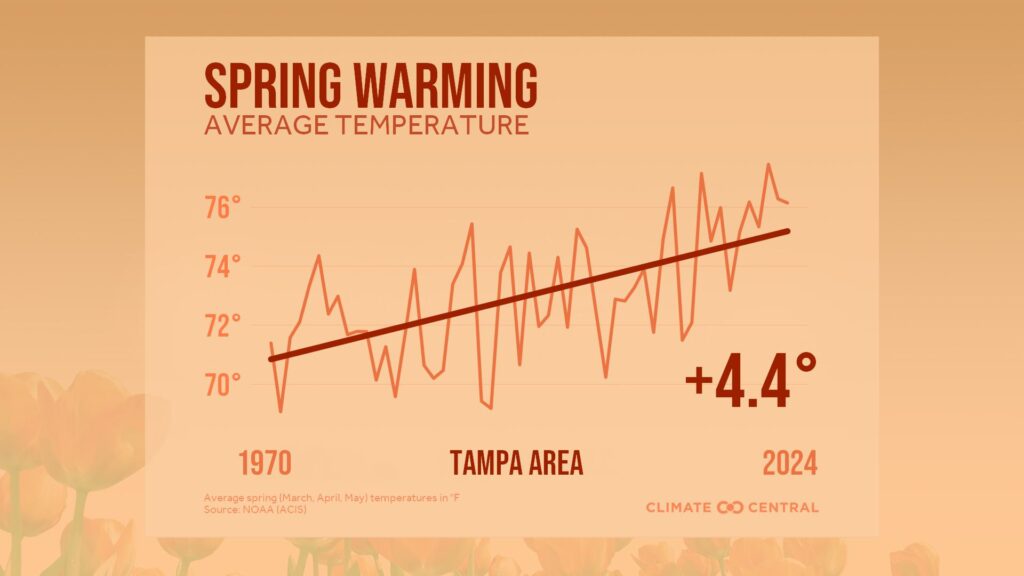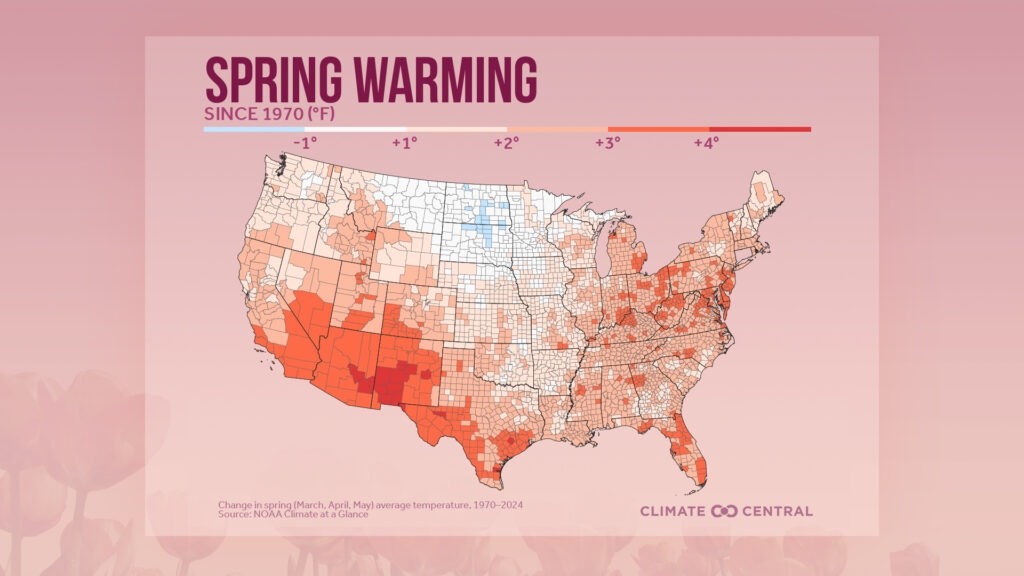By Morgann Rhule, The Invading Sea
As temperatures climb across the U.S. in the spring, Florida is feeling the heat more than most.
A new study from Climate Central, a nonprofit organization that researches and reports on climate science, analyzed temperatures across the country from March to May since 1970. Temperatures increased during that period by an average of 2.4 F in 234 of the 241 cities studied, according to the report.
“We’re seeing a warming for most locations across the United States, and at about 97% of these locations, we’re seeing warming during the spring,” said Climate Central meteorologist Lauren Casey.
For sun-seekers, it might sound like a dream. But rising temperatures can pose risks for people with intense allergies, wildfire-prone regions and ecosystems already under stress.

Several Florida cities ranked among the fastest warming in the country. Tampa saw the second-largest increase of any area analyzed, with 37 more spring days above historical averages since 1970.
Five other Florida locations ranked in the top 20 nationally for increases in warmer-than-normal spring days: Fort Myers/Naples (31 days), Miami (30), Sarasota (29), Tallahassee (26) and West Palm Beach (26).
Florida experiences warming trends earlier in the year than most other states, largely due to its surrounding waters. The warming of the oceans plays a significant role in the state’s climate.
“Those sea-surface temperatures impact what is going on, on land, but certainly for coastal locations,” Casey said. “Climate is also warming our oceans and warming our sea surface temperatures up to record levels; you’re also dealing with that warmth and moisture moving on shore.”
Rising temperatures mean more than just needing to pack a fan before you leave home. Fire weather, characterized by high heat, low humidity and strong winds, has intensified nationwide since 1973, making spring the fastest-growing fire season.
Meanwhile, warmer winters and springs are extending mosquito seasons, increasing health risks caused by the diseases they carry. Warmer temperatures can also prolong seasonal allergies.

Madison Denizard, a South Florida resident, has firsthand experience with allergies. Having dealt with them her whole life, they worsen in the spring.
“When I lived in central Florida, I would be itchy in multiple places on my body, my eyes. I would be sneezing a lot,” Denizard said.
For Denizard, high humidity, dust and pollen are the most common triggers for her allergies. According to Casey, rain can also play a surprising role in worsening allergy symptoms.
“Rainfall can actually be a little bit more detrimental as far as experiencing allergies because heavy rain can break apart the little teeny, tiny pollen pieces and make them more easily disperse by wind, and then you breathe those in,” Casey said.
The combination of Florida’s challenging climate and the prevalence of allergens makes managing allergies even more difficult.
“I definitely think Florida makes dealing with them harder because of how much worse the humidity and pollen is here than places farther north,” Denizard said.
Morgann Rhule is a senior majoring in multimedia journalism at Florida Atlantic University who is reporting for The Invading Sea during the spring 2025 semester. Banner photo: The sun sets behind the Sunshine Skyway bridge over Tampa Bay (iStock image).
Sign up for The Invading Sea newsletter by visiting here. To support The Invading Sea, click here to make a donation. If you are interested in submitting an opinion piece to The Invading Sea, email Editor Nathan Crabbe at ncrabbe@fau.edu. To learn more about climate resilience, watch the video below.



